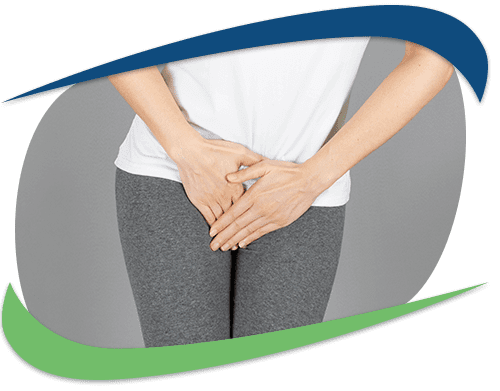Bladder Incontinence
There are many types of bladder incontinence and many reasons why it can happen.
Incontinence is described as the involuntary loss of urine.
Stress Incontinence
Do you leak when you cough, sneeze, laugh, run or maybe even when just walking?
Stress incontinence is a common problem that affects women more than men. It is mainly caused by weakness or overactivity of the pelvic floor muscles and can happen with any activity where you use your tummy muscles which in turn puts pressure on the bladder. Note it is common, but not normal. You should never leak.
Stress incontinence can occur due to pregnancy and childbirth (especially with an assisted delivery or multiple pregnancies), chronic straining on the toilet or a chronic cough. Symptoms usually start following childbirth or after menopause. Treatment is aimed at strengthening the pelvic floor muscles as well as making sure they can relax completely too. The first thing we do is make sure you can do the contraction correctly (50% of women can’t) and then we will tailor a programme to suit you and your muscles. It is important that you don’t change your fluid intake or toilet habits to try and alleviate your symptoms. It doesn’t work and can turn the problem into an overactive bladder issue.
Make an appointment to see Karuna if you have any symptoms of bladder incontinence.
Overactive Bladder and Urge Incontinence
Do you go to the toilet more than seven times and day or do you have to get up at least twice a night to empty your bladder?
Do you have to rush to get to the toilet?
Do you know where every toilet in town is?
Do you get a sudden urge to pee when you put the key in the door?
These are some of the signs of an overactive bladder. An overactive bladder may be diagnosed if you have any or all of the above symptoms. It is caused by involuntary contractions of the bladder. In other words, the bladder muscle contracts to empty your bladder at a time that is not convenient and you are not able to switch off that contraction. In some cases, it can be so strong that your bladder can empty on the way to the toilet. This is a very distressing condition and can hugely affect one’s quality of life. People with an overactive bladder may not stray far from the toilet for fear of bladder incontinence and will know where every toilet in town is. They will also regularly go ‘just in case’. Drinking too much coffee or tea can exacerbate the issue.
If you have any of the above symptoms, you can book to see one of our specialist women’s health physiotherapist, Karuna or Linda. Your physiotherapist will take a full history and may get you to fill out a bladder chart so that she get the full picture of your symptoms. She may assess the pelvic floor muscles as a strong muscle will help you to get to the toilet on time. She would then advise you on a bladder training programme. Medications can sometimes help and we will refer you to your GP if we think they are appropriate.

